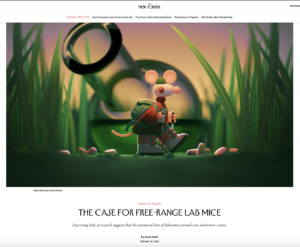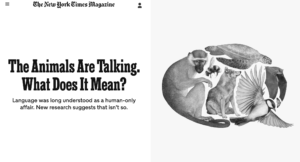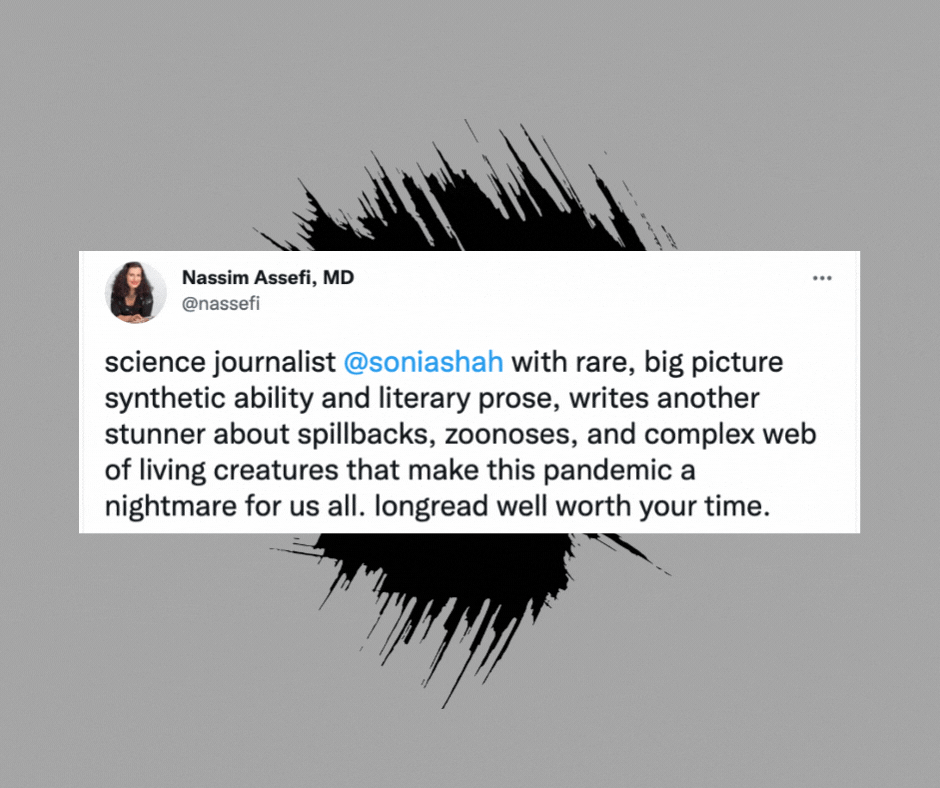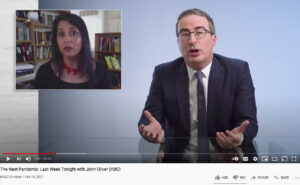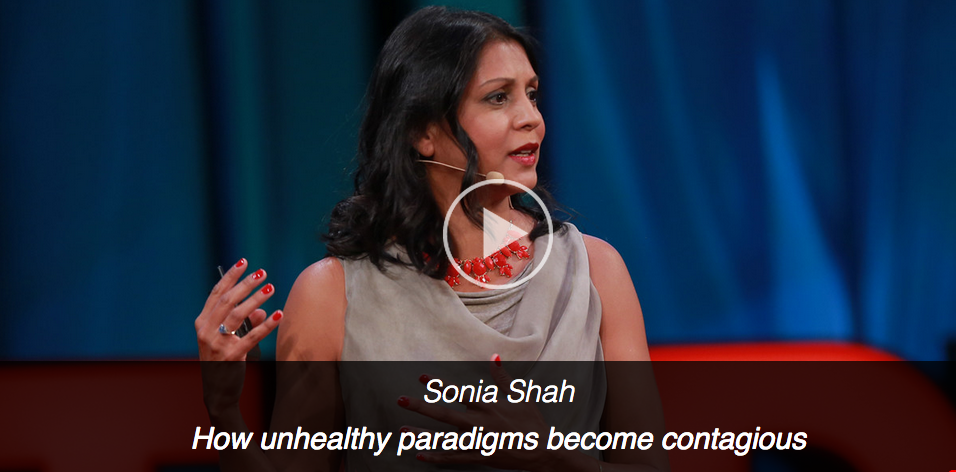A short but pointed interview with me appears in The Internationalist this week, along with a cool watercolor portrait (!). Check it out at The Internationalist.
Category: Articles (Page 6 of 7)
I recently asked a bunch ofnurses at a NIH-funded malaria research clinic in Malawi where all thelocal malarial mosquitoes bred, and they answered in unison–“in theswamp.” Not so, said the mosquito biologist in the next building over.In fact the bugs that were killing their patients nursed their young inthe puddles right outside the hospital’s unscreened windows.
To think that we could develop a man-made mosquito–our ownsuper-mozzie–more adept than those in the wild, with their greatdiversity of habits and lifestyles greatly underestimates the wilinessof these dappled flies. Stalked by pathogens, relied upon by no creature,these insects have thrived for over 100 million years, in almost everyplace where the sun shines and the rain falls, however seldom. They’refantastically good at it. Some GM mosquito might beat a few of thesehardy survivors, in some places, at some times, but they couldn’t beatthem everywhere.
GM mosquitoes surely will teach us somethingabout the spread of malaria but they won’t end it. As with DDT, there’sno one-size-fits-all solution to malaria, our most ancient scourge, tryas we might to find one.
No sympathy from Tauzin—a cancer survivor himself—for those sickly elders compelled to hobble onto buses to Canada to buy affordable medicines, either: according to Tauzin, these unfortunates are no better than Al-Quaeda conspirators “opening our borders…to future terrorist attacks.” (And for those concerned about the potential for abuse in tens of thousands of secretive clinical trials conducted on the untreated poor of the world, Tauzin points to PhRMA’s toothless “principles” on ethical research as indicative of the industry’s “more responsible role” in “clinical trial transparency and openness.”
As another legislator-turned-lobbyist J. Bennett Johnston observed, “everybody should have a job where they use the knowledge, talents and skills they have.”Quite. Nexium, anyone?
From my Washington Post review of a new book by Terry Tamminen, former head of the California EPA, which ran today:
“The corollary to the new truism that Americans are “addicted” to oil is that we can kick the habit just as we did with Big Tobacco — by penalizing the producers of the drug. So says California Gov. Arnold Schwarzenegger’s former environmental adviser, Terry Tamminen, in Lives Per Gallon.
Just like tobacco companies, Tamminen writes, oil and car companies have deceived us into consuming addictive products that pollute the airand make us sick. Describing how automakers and oil companies dismantled the electric trolley systems of numerous American cities in the 1920s, tricked us into using the most polluting fuels and stymied development of cleaner alternatives, Tamminen calls for a fusillade of lawsuits similar to the one that California’s attorney general filed against auto-makers last month for the “public nuisance” of selling greenhouse-gas-spewing cars.
Curtailing tobacco use wasn’t easy,but quitting oil — lifeblood of the economy — would seem quite a bit harder. And yet the Big Tobacco-style approach to slashing oil consumption works for Tamminen because he believes that hydrogen can easily replace oil’s BTUs.
He tries to sell us on hydrogen’s promise with stories about California’s model hydrogen-filling stations and enthuses about hydrogen zapped into being by solar and wind power. His rhetoric –“How many square kilometers of flat roofs are there at just the Kmarts, Costcos, and Wal-Marts of the world?” — would probably sound great ina speech, but significant technical and political challenges are involved in scaling up these technologies. These Tamminen sidesteps, along with the crucial question as to whether making hydrogen from coal or nuclear power — as President Bush, James Lovelock and a host of others advocate — would be any better for the environment than burning oil.
Nevertheless, shifting to hydrogen may well be less burdensome than continuing with ever-scarcer crude. Skeptics, however,won’t be convinced by Tamminen’s accounting, which reads more like the cost of oil to him, not the rest of us. “Perhaps the greatest threat from our oil addiction,” he announces, “is cancer.” That’s a strange assessment, given the threats of petro-fueled terrorism, global instability and climate change. But then again, Tamminen considers diesel exhaust to be “one of the greatest threats to human health” and blames automakers, whom he battled in the Schwarzenegger administration, for his own father’s smog-induced death from emphysema.
Lives Per Gallon‘s portrait of a corporate conspiracy foisting invisible poisons upon us will certainly inflame public anxiety over dependence on oil, but messages of victimization won’t help us solve our energy dilemmas. Crude is, sadly, much more than a fad, and our energy-intense lifestyleis more than the handiwork of deceitful oil and car companies. If only it were so easy.
Sonia Shah is the author of “Crude: The Story of Oil” and “The Body Hunters.”
© 2006 The Washington Post Company
Important bans protecting prisoners from medical experimentation are on the verge of dissolution.
As reported by the New York Times today in a front-page story, last month the Institute of Medicine recommended that federal agencies drop the bans. The bans, long justified by the fact that people behind bars can scarcely be viewed as voluntarily consensual, stanched a once-booming industry of experimenting on the incarcerated. Drug companies disassembled the testing labs they’d built next to the prison gates.
If lawmakers take up the IOM’s recommendations as expected, the floodgates may once again be opened.
The IOM takes pains to detail researchers’ transgressions against prisoners in scientific experiments–see this NYT video on the Holmesburg trials, for example–but considered that the hypothetical benefits of prisoner research outweigh the certain and well-documented risks.
These lauded benefits, unlike clearly detailed risks, sound wonderful but are curiously vague.
More details to come…For now, chew on the fact that many of the authors of the IOM recommendations conduct prisoner research (to answer various social science and epidemiological questions) themselves. A conflict of interest, perhaps?
Last week’s front-page Washington Poststory detailing a long-suppressed Nigerian government report on Pfizer’s botched 1996 experiment on Nigerian children shines much needed light on a dark corner of globalization: the drug industry’s human experiments overseas. But those who are now calling for stricter regulations on the practice aren’t goingnearly far enough.
According to the May 7 Washington Post, California Rep. Tom Lantos plans to introduce a bill that would require U.S. investigators to detail their planned trials in developing countries to federal regulators. Right now, researchers must provide regulators with such details only if they plan to enroll American patients into their trials.
It’s an important provision, especially considering that most trials render negative results—a drug doesn’twork, or doesn’t work well enough, for examples. Industry scientists rarely trumpet such failed trials in medical journals, advertisements, and the like, so unless there’s some external record of the trial, those experiments just fade into oblivion. That’s especially troubling in the case of trials conducted in poor countries, because many are for drugs that are rarely accessible to the patients who filled the test clinics in the first place. Worse, if something goes awry in such trials—for example, if the drug is revealed as dangerous, or if subjects are unduly harmed, or uninformed—it is unlikely anyone will ever know about it.
Lantos isn’t the only one calling for more early details on such trials. In September 2004, the International Committee of Medical Journal Editors, fed up with drug companies’ selectively publishing only the good news about their products without the bad, announced that they’d only consider publishing those trials registered at inception on a publicly available database, such as the NIH’s ClinicalTrials.gov. The WHO plans to finalize another such effort on May 20, which they are dubbing “international clinical trials day.”
It would be hugely helpful for scientists, patients, regulators, ethicists and journalists to know in advance of the kinds of trials being conducted around the world. But is it enough? After all, hundreds of clinical trials, run by both drug companies and academic researchers, have been routinely listed on government and industry websites for years. Thousands are published each year in the medical literature. These include many condemned as unethical, such as experiments in which pregnant Ugandan women with HIV and malnourished Zambian children with AIDS, for examples, are given placebos rather than active treatments.
Some researchers have justified such experiments on the basis that impoverished, sickly patients in poor countries can’t afford anything better than a placebo anyway, a double-standard that a 2004 Journal of Medical Ethics paper defended as “not the optimal ethical standard…[but] at least not clearly unethical.” In such cases, trial details were readily available, described as ethically dubious, and sanctioned anyway. Clearly, just knowing about overseas trials is nowhere near sufficient to protecting the human rights and dignity of trial subjects abroad.
What we need even more urgently than greater oversight is greater restraint. Unless drugmakers are producing medicines that will be beneficial and accessible to patients in developing countries, let them stay home for their experimentation. After all, what poor, sick patients in developing countries need more of is medical care, not medical experimentation.
Until the benefits of the last hundred years of medical research are readily available in poor countries, why not require that those who benefit from new drugs—the major drug consumers in the United States, Europe, and Japan—shoulder the burden of experimentation that new drug development requires?
Tina Rosenberg’s long opinion piece in today’s New York Times brings much needed attention to the plight of “poor people’s diseases,” from sleeping sickness to tuberculosis (“The Scandal of ‘Poor People’s Diseases,’” New York Times, March 29, 2006). But her argument about malaria—that more DDT would vanquish the disease—is all wrong.
The basic gist of the argument is thus: Americans wiped out malaria using DDT, but because über-green Rachel Carson crusaded against the insecticide in Silent Spring, we self-righteously deprived the rest of the world of the miracle toxin. Two conclusions can be drawn from this little tale. One: post-Carson environmentalists have the blood of Africans dripping from their hands. Two: To quote from the title of a previous Rosenberg story on the subject, “What the world needs now is DDT (New York Times, April 11, 2004)
There are several problems with this story. The first is that DDT didn’t wipe out malaria in the United States.
For the rest of this piece, please see http://www.thenation.com/doc/20060417/shah
Something went horribly wrong in an early experimental trial of a German start-up drug company’s new cancer-and-arthritis med. Sometime last week, the drug—TGN 1412—was given to 6 healthy volunteers in a routine Phase 1 trial, designed to test the drug’s safety. Today, all six of those volunteers are laid up in intensive care wards in Britain, fighting for their lives.
The volunteers “experienced adverse events,” the company stated in its press release. I’ll say. One young man’s head and neck ballooned to three times the normal size. The others suffered multiple organ failure. See the BBC story here.
Here’s how big the drug business is. This company has no drugs in its portfolio. A former Roche exec launched the company, TeGenero, specifically to develop TGN-1412 (and, presumably, other drugs like it.) They got drug giant Boehringer Ingelheim on board to manufacture their as-yet-undeveloped drug. They got the European drug authorities to bestow their unborn med with “orphan” drug status (because along with cancer and arthritis, the drug might also be used for rare diseases.) They raised no less than 14 million Euros…and all this with no proven-effective drug in hand. Until nearly killing some volunteers this week, all the drug had been proven to do was help some artificially sickened rats.
One can only imagine the financial and scientific pressure on the first human test of the drug. On the other side of the test bed, the usual cohort of cavalier and cash-starved students would have lined up. For these kinds of tests, it is students and homeless people who generally bear the burden of risk. Drug companies purposely set up their early testing centers near universities to entice them. Do they understand the risks involved? Who knows? At a payrate of around $100 to $200 a day, including room and board, “it’s money fordoing almost nothing,” as a trial volunteer once explained to me.
Never mind that early trials are, arguably, the mostdangerous of all experimental drug trials. Toxic reactions occur in about 40 percent of all Phase One trials. And as we can see from this botched experiment, sometimes those toxic reactions are a whole lot worse than a minor skin rash.
This time news leaked out. But generally, the public never hears anything about failed early drugs. The experimental drug poisons a few test subjects and is quietly dropped from development, with nary a drop of ink about it, just one in a line of failed drugs lying in the wake of each and every blockbuster. We await the results of the investigation, now ongoing.
Proving pesticides are safe by testing them on humans is harder than proving them safe by testing on animals, so the new standards are actually higher, not lower–i.e. more likely to protect public health! so long as pesticides are being used, i think it is good that the EPA is requiring human testing. why should chemical companies get off with animal testing alone? we’re all exposed to pesticides all the time. either prove the stuff safe for humans or get rid of it altogether, i say.
Aid is a potent drug. It can help or hinder, depending on the circumstances. If you don’t have cancer, for example, a cancer drug will kill you. That’s why the maxim that is meant to guide medicine is to first do no harm. Don’t rush to “help” because your help (being faulty, partial, subjective) could very well be hurtful. First, just don’t actively hurt the patient. So what does that mean for aid in Africa? Debating the pros and cons of “help” is premature. First, let’s stop actively hurting the place: despoiling West Africa for oil; logging rainforests; exploitative mining; dumping toxic waste and cheap, unsellable goods and all the rest of it.



